Report on the situation of organised crime 2021
1. Situation of organised crime and countermeasures in 2021
In response to the escalating conflict between the Rokudaime Yamaguchi-gumi and the Kobe Yamaguchi-gumi, in January 2020 the Law on the Prevention of Unjustified Acts by Bōryokudan Members (hereinafter referred to as the 'Anti-Bōryokudan Law') was introduced. According to this law, the two groups have been declared 'designated groups for specific conflicts' and a 'specific area' (hereinafter referred to as the 'warning area') in which they operate has been the focus of increased vigilance. Nevertheless, the conflict continued.
Measures have been taken to respond to the situation: the designation as 'designated groups for specific conflicts' has been extended, and the warning areas have been reviewed.
In addition, the Kizuna-kai (which changed its name from Ninkyo Yamaguchigumi in February 2020) remains in conflict with both groups. In order to ensure public safety, the Anti-Bōryokudan Law will be used alongside the usual vigilance and thorough control, and the Government will increase efforts to weaken and eliminate criminal groups.
Furthermore, the Kudo-kai was originally designated as a 'Specified Dangerous Designated Gang' in December 2012, and the designation has been extended every year since then. In December 2021, it was designated for the ninth time. As a result of the intensive control of Kudo-kai, the main leaders have been isolated from society for a long period of time, and their offices were closed one after another. In August 2021, the Fukuoka District Court sentenced the leader of Kudo-kai to death, which dealt a considerable blow to Kudo-kai's organisational infrastructure.
In the future, the government will continue to strongly promote investigations of unsolved cases and control measures against funding sources, as well as provide the necessary support for lawsuits for damages filed by victims of Kudo-kai's illegal activities, and further measures to rehabilitate defectors. In addition, in order to make further progress in efforts to eliminate criminal groups, the government will provide appropriate information on gangs to business operators who are working to eliminate gangs, and take measures to protect them.
[1]
2. Situation of organised crime and other anti-social forces
1. Status of gang membership
At the end of 2021, the number of bōryokudan members and quasi-members, etc. (hereinafter referred to as "bōryokudan members") was 24,100 (approximate number). Of these, the number of full bōryokudan members was 12,300 and the number of quasi-members was 11,900 (Chart 1.1)
In addition, the number of members of major groups (Rokudaime Yamaguchi-gumi, Kobe Yamaguchigumi, Kizuna-kai and Ikeda-gumi, Sumiyoshi-kai and Inagawa-kai) amounted to 17,200 (71.4% of all gang members, etc.), of which 9,100 full members (74.0% of all gang members).

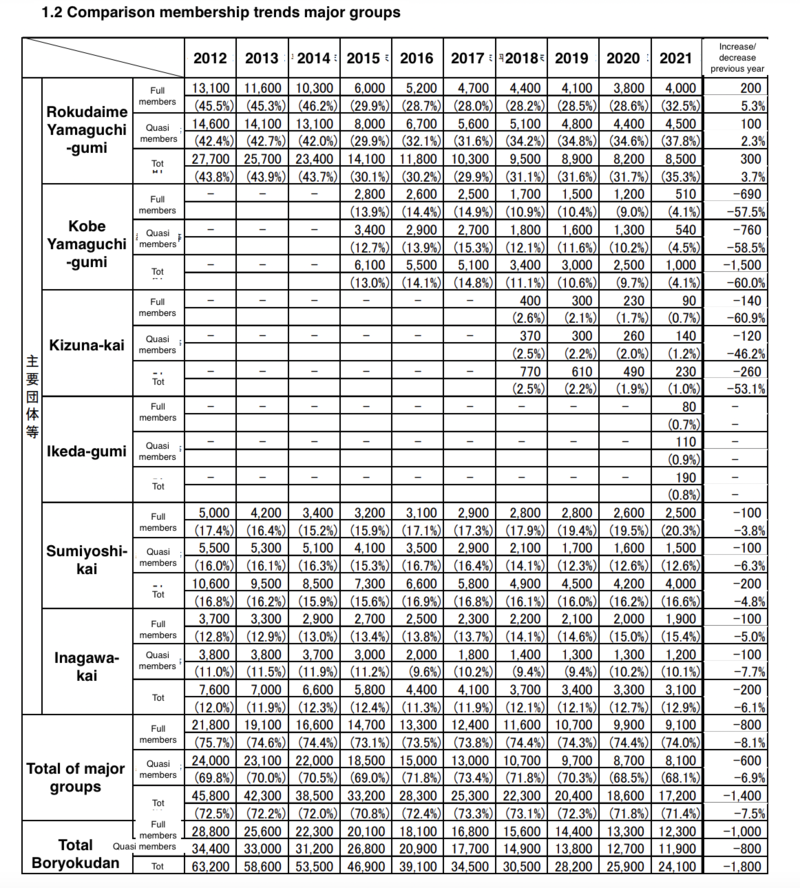
[3]
2. Movements of major associations
The main trends in 2021 in major organisations, etc., are as follows.
(1) Rokudaime Yamaguchi-gumi
In response to the extension of the status as a 'Specified Anti-Struggle Designated Gang', the group is holding its executive committee meetings and block meetings outside the warning area.
The organisation continues to work against the Kobe Yamaguchi-gumi: in order to revitalise the group assistant young leaders are promoted to senior leaders, and the group consistently tries to bring Kobe Yamaguchi-gumi-affiliated groups under their sphere of influence.
(2) Kobe Yamaguchi-gumi In response to the extension of the status as a 'Specified Anti-Struggle Designated Gang', the group is holding meetings outside the warning area.
While leaders of the direct-affiliated organisations retired and some groups transferred to the Rokudaime Yamaguchi-gumi, the position of deputy head of headquarters was newly created and new bosses from affiliated groups were appointed as prefects, thereby maintaining the organisation.
(3) Kizuna-kai
In addition to holding executive committee meetings and block meetings instead of regular meetings, in August 2021 the organisation promoted a number of personnel to the positions of acting and assistant young leader, in order to maintain its structure.
(4) Ikeda-gumi
At the end of July 2020, the Ikeda-gumi announced its withdrawal from the Kobe Yamaguchi-gumi and was designated by the Okayama Prefectural Public Safety Commission as a designated bōryokudan in November 2021.
(5) Sumiyoshikai
In April 2021, the 8th chairman assumed the position of highest-rank representative, and the chairman of the external relations committee became the 9th chairman.
Through dinner meetings, the organisation has also maintained its relations with the Rokudaime Yamaguchi-gumi and organisations in the Kanto region.
(6) Inagawa-kai
In April 2021, the Inagawa-kai appointed new officers in order to revitalise the organisation, and held dinner meetings to maintain relations with the Rokudaime Yamaguchi-gumi and other organisations in the Kanto area.
[4]
3. Situation of anti-social forces and other groups
(1) Situation of sōkaiya (corporate extorsion) and company goros (corporate racketeering)
As of the end of 2021, the number of sōkaiya and company goros (also newspaper goro) cases amounted to 965, and has been decreasing in recent years.
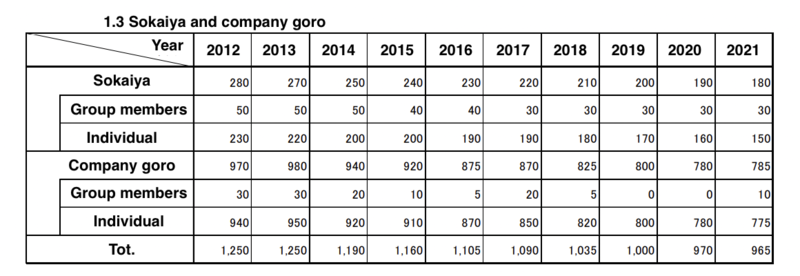
As of the end of 2021, the number of cases of fake social and political campaigning was 4,730 and has been decreasing in recent years.

3. Bōryokudan crime: arrests
1. General arrests situation
In recent years, arrests of bōryokudan members (including full bōryokudan members, quasi-members and other persons related to bōryokudan members) have been declining. In 2021, the number of arrests was 11,735: 1,353 were arrested for assault, 1,008 for theft, 456 for extortion, and 2,985 for violations of the Methamphetamine Control Law (not including violations of the Narcotics Control Law). Compared to the previous year, the number of arrested persons decreased by 276, 149, 119 and 525 respectively, while the number of fraud cases increased by 306 persons to 1,555 (Chart 1.5, 1.8).
As for the arrests of gang members, 2,238 were full members and 9,497 were quasi-members or other related persons, both of which decreased compared to the previous year (Charts 1.5 and 1.6).
The number of cases of bōryokudan members has also been on a downward trend in recent years, with 19,425 cases in 2021. There were 1,119 cases of assault, 6,012 cases of theft, 391 cases of extortion, and 4,512 cases of violation of the Methamphetamine Control Law. Compared to the previous year, the number of cases decreased by 247, 700, 43, and 576 respectively, while fraud increased by 388 cases to 1,933 cases
(Chart 1.7).
[6]
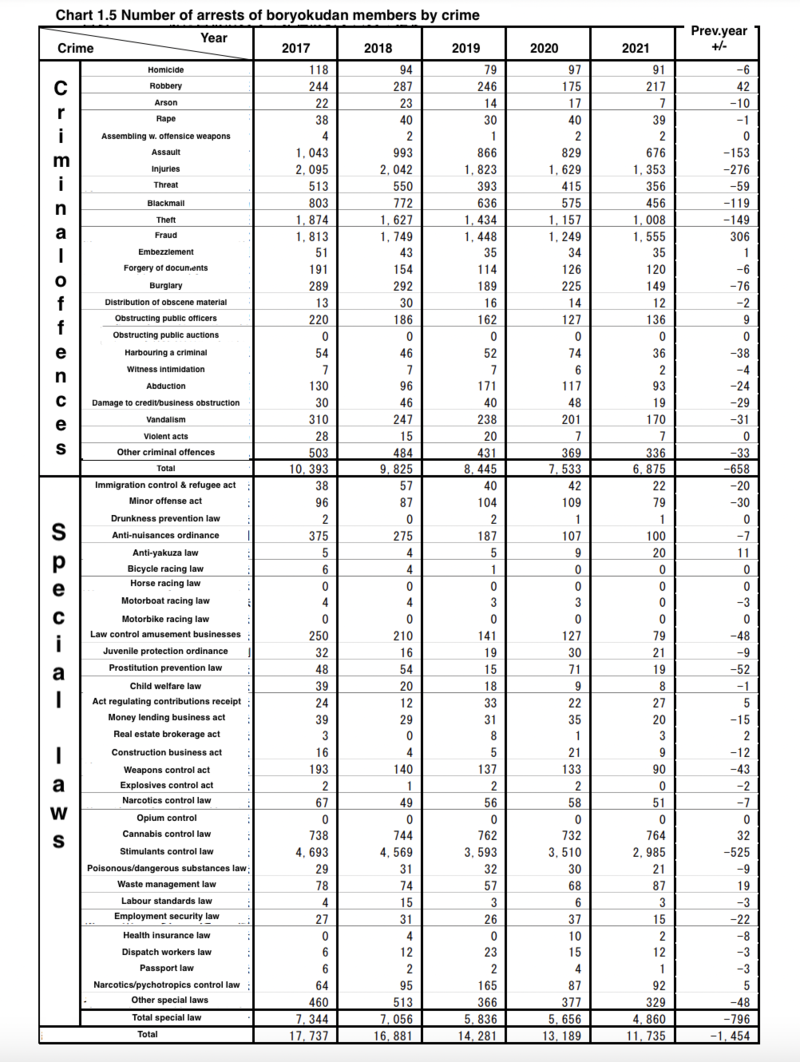
[7]

[8]
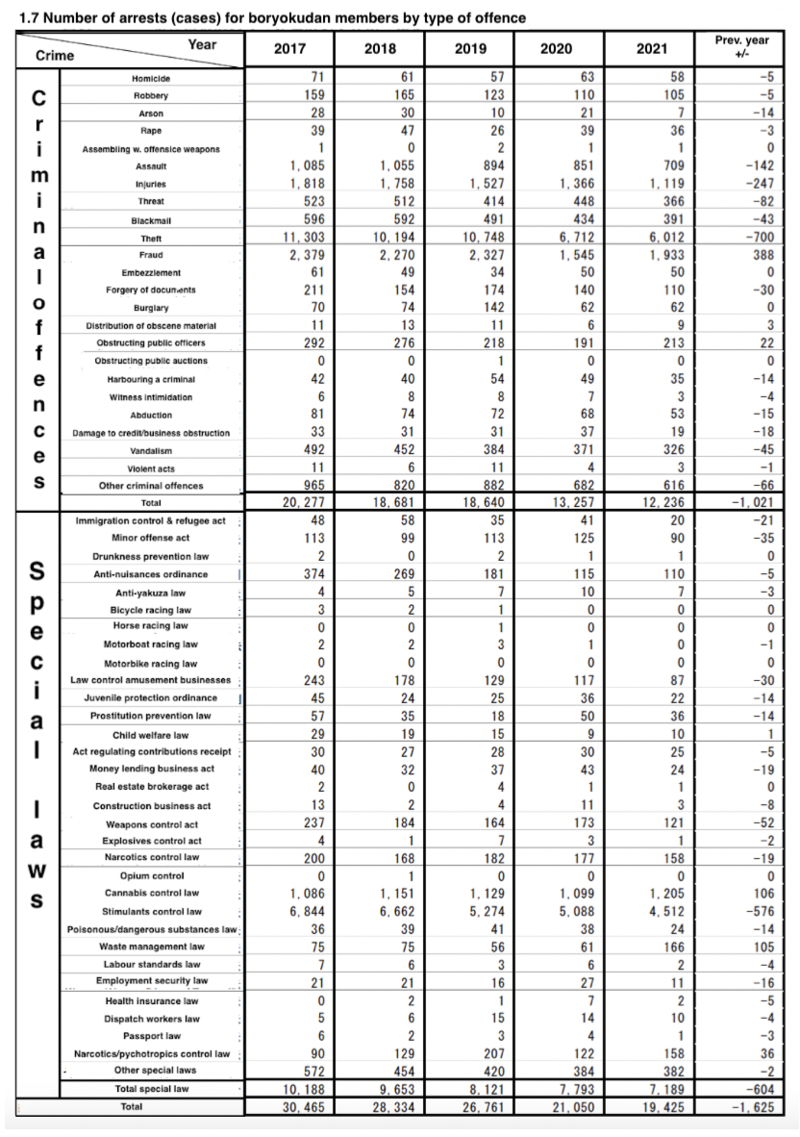
[9]

2. Arrests for crimes related to the main bōryokudan groups
In recent years, the proportion of arrests of members from the Yamaguchigumi VI, Kobe Yamaguchigumi, Kizuna-kai, Sumiyoshi-kai and Inagawa-kai has remained at about 80%. In 2021, 9,354 persons arrested accounted for 79.7% of the total. Of these, the number of arrests of Rokudaime Yamaguchi-gumi accounted for 4,496 persons, about 40% of the total number of arrests of bōryokudan members (Chart 1.9).
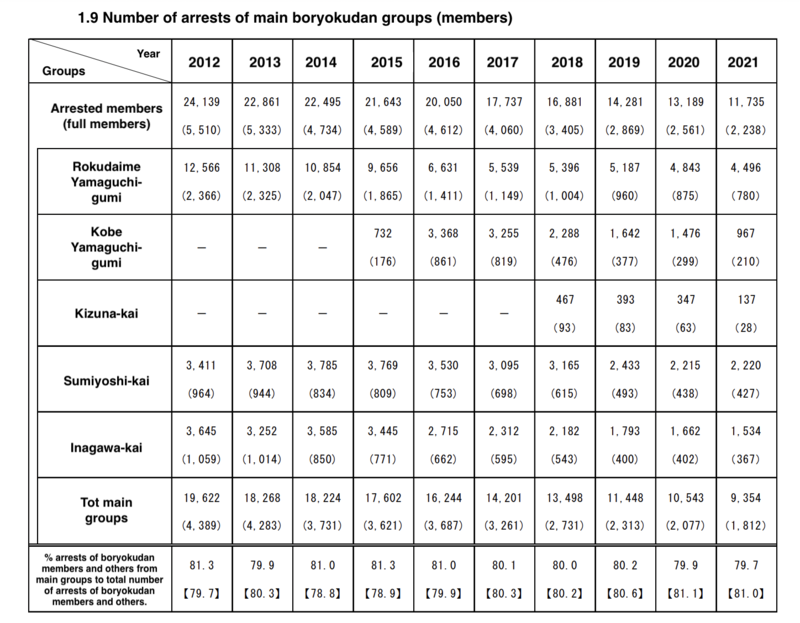
[10]
3. Intensive control over Rokudaime Yamaguchi-gumi and Kōdō-kai
The Rokudaime Yamaguchi-gumi continues to be the largest bōryokudan even after the Kobe Yamaguchi-gumi split at the end of August 2015. In order to weaken the group, intensive control is carried out against the Kōdō-kai and its affiliated organisations, which effectively control the Rokudaime Yamaguchi-gumi.
In 2021, seven Rokudaime Yamaguchi-gumi bosses, 12 Kōdō-kai bosses, and 31 Kōdō-kai senior members were arrested (Chart 1.10).

Case: Fraud case involving members of the Kōdō-kai (October 2021, Metropolitan Police Department)
In July 2020, members of the Kōdōkai's applied for benefits with the intention of fraudulently taking advantage of the government's Sustaining Benefits Scheme. They accessed the application page, concealed the fact that they were bōryokudan members, pretended that the sales of the company they managed had decreased, and received ¥2 million in cash. By October 2021, the group leader and other members were arrested for fraud.
[11]


